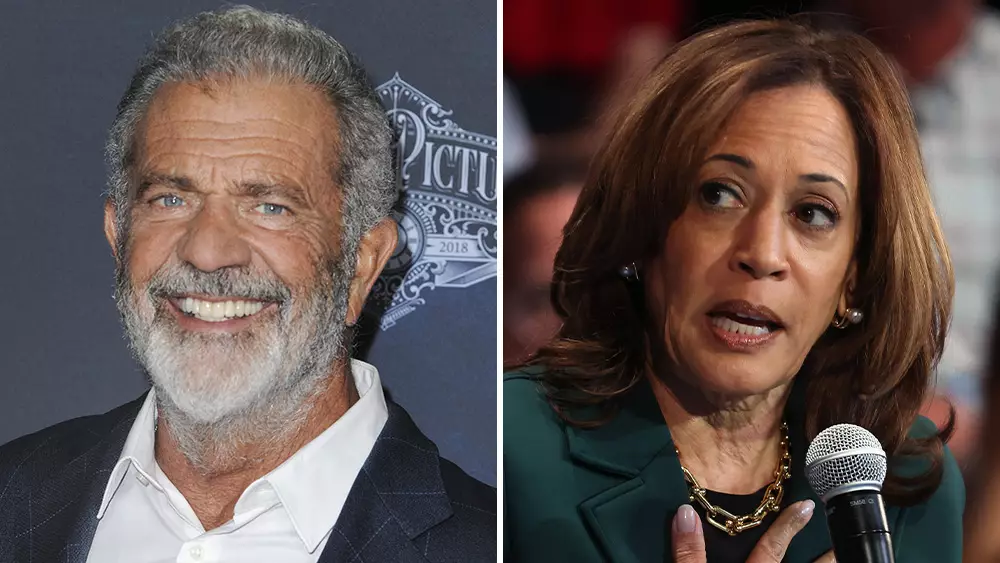In recent days, Andrew Garfield’s commendation of Mel Gibson for his personal transformation drew attention, but it also brings forth a stark contradiction in Gibson’s recent remarks that have sparked outrage. As the world observes the intertwining of celebrity culture and political discourse, the implications of such controversial statements merit a broader examination.
The Praise and the Insult: A Dichotomy in Perception
Andrew Garfield’s comments regarding Mel Gibson’s “beautiful healing with himself” hint at a narrative of redemption that popular culture often embraces. However, this notion sharply contrasts with Gibson’s recent disparaging remarks about Vice President Kamala Harris, where he infamously suggested that she has “the IQ of a fence post.” This juxtaposition raises questions about the nature of forgiveness and whether true transformation is possible when one continually reverts to derogatory language and behavior.
When one celebrity praises another’s journey toward growth, it can influence public perception significantly. Yet, Gibson’s latest comments highlight how his troubled past still lingers, overshadowing any attempts at redemption. The inconsistency in public figures’ behaviors fundamentally challenges how society reconciles the idea of rehabilitation with the reality of repeated missteps. Garfield, in particular, may want to reconsider his stance on Gibson and the implications of associating with someone who fosters derogatory stereotypes and language.
Gibson’s remarks align with a troubling trend among certain celebrity figures who employ their platforms to discredit political leaders, resorting to personal attacks rather than engaging in substantive dialogue. When Gibson claims the Vice President has a poor track record and no policies, it echoes similar sentiments expressed by former President Trump, who has consistently targeted Harris with denigrating remarks. This pattern of behavior, characterized by insult rather than constructive criticism, raises questions about the role of celebrities in shaping political dialogue.
By reducing complex individuals to simplistic labels, such as calling someone “low IQ,” Gibson participates in a form of discourse that benefits from sensationalism but often lacks depth. Such statements contribute to a divisive atmosphere, reinforcing echo chambers rather than promoting understanding. When public figures engage in this rhetoric, it invites their followers to do the same, perpetuating a cycle of hostility.
The Weight of the Past: Understanding Gibson’s History
Gibson’s history is well-documented, filled with troubling instances of misogyny and antisemitism that cannot be easily overlooked. In 2006, Gibson was arrested for DUI and made inflammatory and antisemitic remarks. His subsequent apologies have not entirely mitigated the damage done by those earlier statements. The resurfacing of past behaviors often complicates narratives of redemption and begs the question: can someone truly change if they continue to espouse harmful views?
Moreover, the incident in which Winona Ryder alleged Gibson made disparaging remarks regarding her ethnicity reflects a pattern of inconsiderate behavior that stands juxtaposed to public claims of having evolved. Such allegations are significant because they challenge the notion of change; can a person really transform if they continue to express prejudiced views?
As celebrities increasingly insert themselves into political narratives, it is crucial to recognize the potential ramifications. Stars like Gibson wield enormous influence, and their words can incite public outrage or sway opinions significantly. However, this influence comes with a responsibility to engage thoughtfully rather than resorting to personal attacks that detract from crucial issues at hand.
Kamala Harris’s responses to Trump’s rhetoric, characterizing him as “increasingly unhinged and unstable,” reflect a counter-narrative that strives to uphold standards of political decorum. While celebrity commentary can elevate issues, it must also encourage accountability and temerity in discourse—an element that Gibson’s comments seem to undermine.
The juxtaposition of Andrew Garfield’s praise for Mel Gibson against the backdrop of Gibson’s latest comments serves as a potent reminder of the complexities surrounding celebrity culture and political discourse. Transformative narratives in public life must be weighed carefully against past actions, and the continued use of derogatory language underlines the importance of promoting constructive dialogue. As society grapples with these issues, it is imperative that the discourse shifts focus from personal attacks to fostering understanding and accountability among those in the public eye.


Leave a Reply